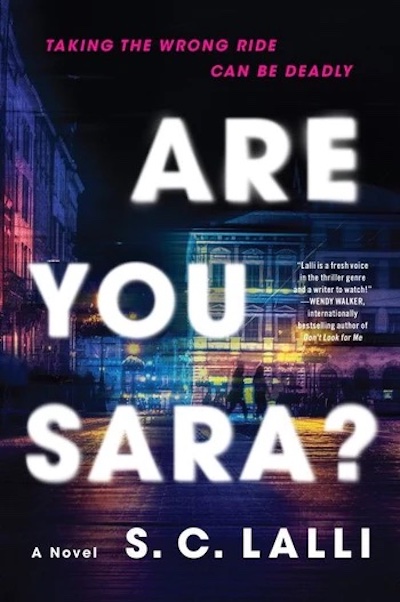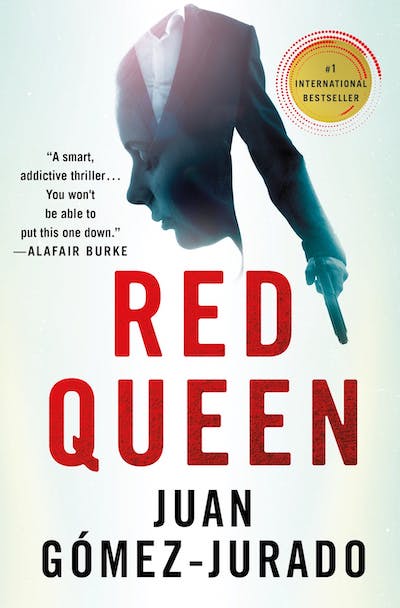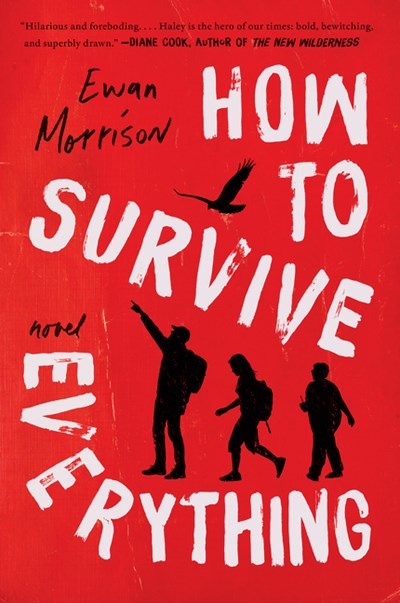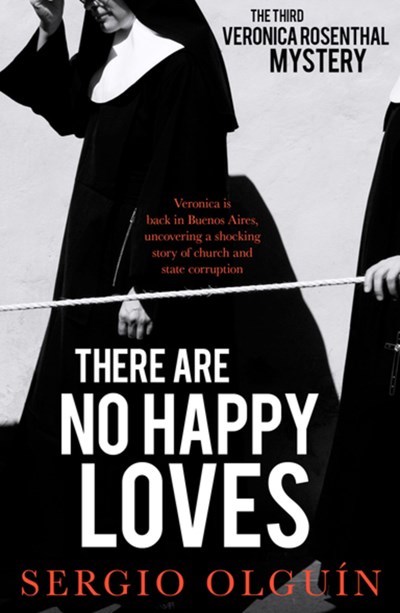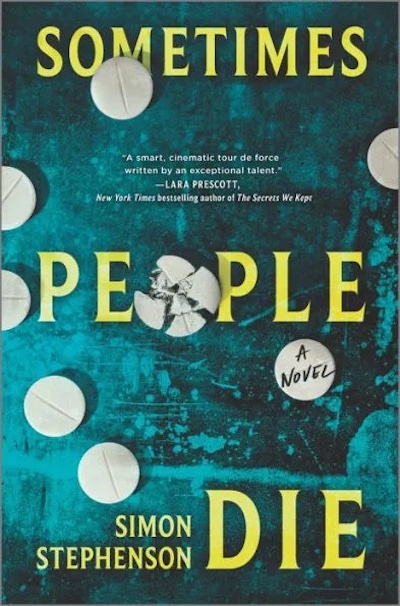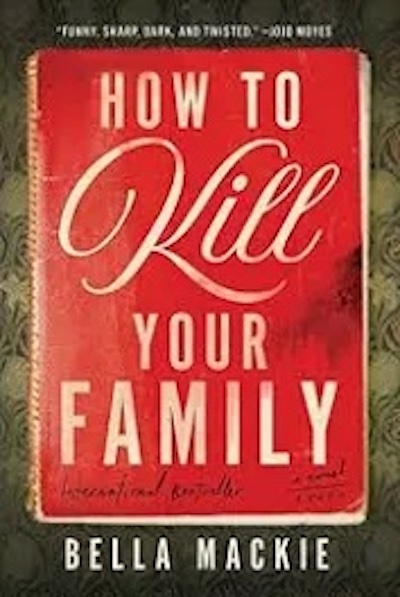A complex tale centered around law student Saraswati “Sara” Bhaduri, who’s struggling financially to put herself through law school. One of her side gigs is bartending at a dive bar, which is how she meets up with Sarah Ellis, who’s passed out in the women’s room one closing time. Oddly, they hit it off as they wait for their Ubers, which arrive at the same time. Sara jumps in and in seconds is asleep—only to wake up miles from home in the rich part of town. There’s only one explanation: they mixed up their cars. When she makes it home, it’s to find her building a crime scene and Sarah dead. Is Sara in some way responsible? Sara’s guilt may seem odd at first, but as the novel expands—and we learn more about her life—the pieces start to fall into place. It’s fun to see Sara take even greater charge of her life as she fights to learn what happened to Sarah and what might be her own fate. A fresh and powerful new voice, this is a crime writer to watch.
Thrillers
Hyped as sweeping bestseller lists in Europe, and for good reason, this has all the velocity and thrills of Stieg Larson’s Millennium series but none of the eyeroll-inducing misogyny. “Antonia Scott allows herself to think of suicide no more than three minutes per day,” opens the book. She believes her life to be destroyed as her husband has been in a coma for years. Jon Gutiérrez is the latest disgraced Madrid cop forced by a mysterious character, who calls himself Mentor, to try to get Antonia back on the force. Jon’s between police partners, having left “the Cristiano Ronaldo of Scrabble,” his previous partner, at his last job. He doesn’t have a boyfriend at the moment either. That’s lucky, because it takes all his wiles to deal with Antonia, a woman who’s been trained to have superhuman recall and powers of deduction. She returns to work, and her odd-couple partnership with Jon is pitted against the sinister kidnapper of one of the richest women in Spain, who has left what may be religious symbolism at crime scenes and who drags the partners into some incredibly tense situations (and has an out-of-the-blue twist in store). Word lovers will relish Antonia’s asides that spring from her hobby of collecting expressive words, such as the Inuit Ajunsuaqq, which means to bite a fish and get a mouthful of ash, and the Wagiman murr-ma, searching for an object in the water with your feet. It’s all engrossing, and best of all, this is the first in a trilogy.
Meredith Morris-Dale used to work with her husband, John. Now they’re divorced and moving on, their daughter grown and out on her own and John retired and pursing his passion as an artist. Meredith’s job needs John for one last gig, though. That wouldn’t be too unusual except that the task is for him to re-up in the CIA and re-establish contact with a scientist who’s sabotaging Iran’s effort to build a nuclear bomb. John was suspended from “the company” for an operation that went wrong, the traumatic details of which are slowly revealed; he also doesn’t want back in, but Cerberus, as the Iranian scientist is known to the CIA, won’t deal with anyone else. Soon John’s on a perilous journey to find Cerberus, a journey on which he’s pursued by other global bad guys who are using him to pin down details of the international spy network and move up in the superpower ranks. From the opening, this is like the best kind of action movie—fast moving, smart subplots, hair-raising escapes from death. Adding to the action is John’s decency toward the good people he meets and ruthlessness with all the rest. If you’ve ever wondered what a much scruffier James Bond would be like, this is the book for you.
A brilliant look at pandemics through the eyes of Haley, a 16-year-old girl who, with her little brother, are abducted from their mother by their father and taken to a rural farm—no Internet, no cell phones—in northern Scotland. They join a handful of survivalists, Haley’s dad is clearly the ringleader, and they’re waiting for the next pandemic, which should be arriving any day; a new virus, more horrible than anything we can imagine, has just made its way to the U.K. Bleak? Indeed. But fascinating, and even comic at times. Haley writes the book as a sort of parody of her father’s survivalist manual, with her own sarcastic spin (“How to Abduct Your Own Children,” “Home Surgery for Beginners.”) Add to this rich details about life on the compound, a budding romance with the one other teen in lockdown, and continual speculation about her parents, both of whom she believes to be crazy—any reader would agree—and whose epic divorce left her having to always choose between them. At the heart of the book is the question of truth. Is the world beyond the barbed wire that surrounds the farm really erupting in chaos, with riots in the streets and bands of the infected roaming the countryside? Or is life as they knew it chugging along, little different except that Haley and her family have left it? And does Haley—or any of the survivalists—really want to know the answer? A bit of crime fiction, a lot of dystopia, and 100 percent compelling.
What a wild ride this book is. The third in Olguin’s series set in Buenos Aires, it features the tough-hitting, brazen, flawed, but brilliant journalist Verónica Rosenthal, who loves her whiskey, her lapdog, her ex-boyfriend, and great sex, preferably with strangers. As the novel opens, there is a horrific car crash followed by an explosion, leaving one survivor, Darío, who becomes convinced that his wife and child didn’t die in the conflagration but survived and ran away. Is it possible? Later, a truck is pulled over in Buenos Aires, thought to contain drugs. But the cache is far more gruesome: a load of human body parts. Verónica pursues the missing wife and child, ultimately publishing a feature about a right-wing Catholic organization, the Christian Home Movement, which took young children from poor or single mothers and placed them in well-off Catholic families. At the same time, and unknown to Verónica, her ex-boyfriend is after the body smugglers, and eventually the two storylines converge, as do the lovers. But don’t for one minute think this is some linear thriller. This book ricochets from family drama to Argentinian history to the picaresque (Verónica in nun’s garb, infiltrating a convent) to the deeply emotional. While this can be read as a stand-alone, this series builds on itself wonderfully.
Isabel Henley leaves Boston for the remote coastal Scotland college of St. Stephens, ready to immerse herself in a feminist perspective of Catherine de Medici’s court. She’s chosen St. Stephens so she can work with Professor Madeleine Grainger, but arrives to find that Madeleine has fallen from cliffs near the school and died. There are whispers that it wasn’t an accident, but Isabel hopes they’re just drama—St. Stephens is quite the gossip hothouse. Isabel’s other contact, Rose Brewster, a student she knew in Boston, soon disappears mysteriously, leaving Isabel both socially bereft and unsure of her future at the school. Then things take a turn, both for the better and the much worse. Isabel takes over Rose’s dissertation—it’s funded!—and she’s off to Genoa, Italy, to research the history of a family still living there, the decidedly odd Falcones. Isabel is locked into their home’s archive every day by the debonair son of the house, deciphering letters written during the Renaissance that offer a tantalizing look at past life and politics (a Falcone was involved in a conspiracy to assassinate French king Henry III) and a chance to save Rose. Also tantalizing is Margaret’s language, which immerses us in Genoa’s “intestinal alleys” and Renaissance passive aggression (“I know I can expect nothing in return except for your contempt” is a winning line in one love letter). There are two attractions here: the present-day academic whodunit and the olden puzzle revealed in Renaissance letters; viewers of the Netflix series “The Chair” will eat this up, as will readers of Philippa Gregory and Robert J. Lloyd.
If you open this book thinking it’s a medical thriller—which is how it’s marketed—then you’ll be terribly disappointed. But take it on its own terms and it is one of the most evocative and heart-rendering tales you’ll have encountered in quite a while. A young Scottish doctor, caught stealing and using opioids, is deemed fit to return to practice and lands in St. Luke’s—one of London’s roughest hospitals and a place that’s desperately in need of staff. Author Stephenson was trained as a doctor, and this book goes deeply—and fascinatingly—into life in the hospital. Add to this a great cast of characters, including George, an orthopedist, rugby player, and teddy bear of a man who rooms with our protagonist, helping to keep him grounded. The criminal element comes into play when it’s discovered that several of St. Luke’s patients have died from opioid overdoses, clearly at the hands of medical personnel, with our narrator suspect number one. Woven throughout the book are the stories of doctors throughout history who doubled as serial killers—these sojourns away from the narrative will drive some readers crazy but I found the context they provided fascinating. In the end, the book comes down to just a few characters and a couple of questions: How does medicine, “a dark and a terrible knowledge,” force its practitioners to see things differently? And what’s the impact when they do see differently?
Reflecting the dark days of summer 2020, this book opens with Black reporter Caleb Moon covering the police killing of a Black boy and the local anger that has ensued. His editor is tiptoeing around the coverage and wants to cut the inflammatory detail that the police also shot the boy’s pet (“It’s just a fucking dog.”) He knows it’s relevant, though, when Caleb explains that the animal that three police officers found such a violent threat could fit in a colleague’s tiny purse. This is a case of overkill, and Caleb wants justice. He’s at first naïve enough to think that it might be in the cards, but then he attends the police chief’s speech about the situation, where white interlopers throw a bottle at the cops and disappear. Hope is close to vanishing; it evaporates entirely when a Black colleague is lynched. Things can hardly get worse, but Caleb soon finds himself in jail when he won’t plead guilty to causing trouble at the speech. His experiences in jail, coupled with the growing mystery of who’s behind the racist corruption eating away at his unnamed small town, paint a stark picture of a world built on greed and white supremacy. Readers will be eager to meet this understated, determined young protagonist in further mysteries. The book doesn’t reveal SLMN’s identity, but notes that he is a New York Times best-selling author and a movie producer.
Originally reviewed as Race: A Black Lives Matter Thriller
Best title of the year, amirite? And the best antihero as well. Grace Bernard was raised in London by her loving but impoverished single mom. Her father, a multi-millionaire, won’t have anything to do with them, even when Grace’s mother is dying and begs for support for their daughter, then a young teen. But by her mid-twenties, Grace is ready to take matters into her own hands and avenge her mother’s hard life. Grace doesn’t want to just polish off dear old dad. She slowly and meticulously plots the murders of everyone on the paternal side of her family, with her father last on the list, having watched his parents, children, and in-laws die before him. Yes, it’s dark, but it’s also deliciously wicked and brilliantly plotted, so much so that Grace is a bit wistful that no one except her will enjoy the genius of it all. Thus this book, which is meant to be locked away and discovered by future generations. Until something most unexpected occurs, upending Grace’s brilliant plan. Grace is sophisticated, urbane, droll, and at times risible. I could listen to her voice forever.
How’s this for a setting: a 205 unit high-rise building in rural Alaska that houses the entire town’s population as well as stores, offices, and more. Welcome to Point Mettier, a pretty creepy village to begin with that only gets worse when body parts—a foot, a hand—wash up on the frozen shore. The local cops seem ready to shrug off the remains—lots of tourists fall off those cruise ships!—when they’re joined by Anchorage detective Cara Kennedy, who takes the matter a whole lot more seriously. What was meant to be a quick visit becomes a much longer excursion as the first brutal storm of the season moves in, closing off the tunnel, the one way in and out of town during winter. With time to spare, Cara digs deeper into the community, only to discover that almost everyone in Point Mettier has a secret to hide. A simmering romance with one of the other officers provides Cara with much needed distraction, but soon enough a violent gang, hanging out in a nearby Native village, takes center stage. This is a successful, well-paced first novel that juggles a range of cultures, a handful of strong characters, and a nuanced protagonist, delivering a very satisfying ending. And get this: Point Mettier pretty much actually exists. Check out Whittier, Alaska.

